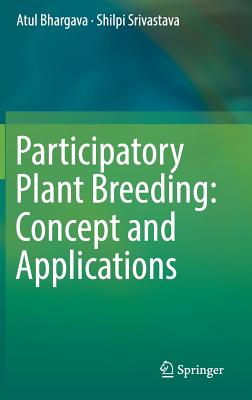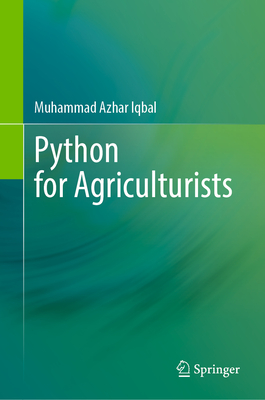Participatory Plant Breeding: Concept and Applications
暫譯: 參與式植物育種:概念與應用
Bhargava, Atul, Srivastava, Shilpi
相關主題
商品描述
This book explores the potential of PPB in the coming decades. The topic is more relevant since international breeding efforts for major crops are aimed at decentralizing local breeding methods to better incorporate the perspective of end users into the varietal development process. The first book incorporating the upcoming research on this novel breeding approach, it reviews the important tools and applications of PPB in an easy-to-read, succinct format, with illustrations to clarify these complex topics. It provides readers with a basic idea of participatory plant breeding as well as advances in the field and insights into the future to facilitate the successful integration of farmers into breeding programmes. This book is a valuable reference resource for agriculturists, agricultural advisers, policy makers, NGOs, post-doctoral students and scientists in agriculture, horticulture, forestry and botany.
商品描述(中文翻譯)
植物育種在人類文明的發展中扮演了重要角色。傳統植物育種透過基因改造農業上重要的性狀,顯著提高了作物產量。然而,它常常受到批評,因為忽視了本土種質,未能滿足邊緣和貧困農民的需求,並強調對廣泛適應性而非地方適應性的選擇。參與式植物育種(Participatory Plant Breeding, PPB)是生產者和其他利益相關者積極參與植物育種計劃的過程,並在整個過程中有機會做出決策。參與式植物育種工作組(PPBwg)於1996年在國際農業研究磋商小組(CGIAR)的框架下成立。PPB的研究可以促進消費者和生產者對研究的知情參與和信任,近年來,PPB在食品生產方面產生了顯著影響,能夠快速且具成本效益地生產改良作物品種。同時,這一領域的研究也取得了顯著進展。PPB提供了顯著的優勢,特別是對於那些在植物育種上未能帶來產量增加的大型投資的發展中國家,尤其是在邊緣環境中。除了經濟利益外,參與式研究還具有多種心理、道德和倫理上的好處,這是農業社區逐步賦權的結果。PPB可以賦權於傳統上被排除在發展過程之外的群體,如女性或較不富裕的農民。
本書探討了未來幾十年PPB的潛力。這一主題變得更加相關,因為國際對主要作物的育種努力旨在去中心化地方育種方法,以更好地將最終使用者的觀點納入品種開發過程。這是第一本整合即將到來的這一新型育種方法研究的書籍,以易讀且簡潔的格式回顧PPB的重要工具和應用,並附有插圖以澄清這些複雜的主題。它為讀者提供了參與式植物育種的基本概念,以及該領域的進展和未來的見解,以促進農民成功融入育種計劃。
本書是農業學者、農業顧問、政策制定者、非政府組織、博士後研究生以及農業、園藝、林業和植物學科學家的寶貴參考資源。
作者簡介
Dr. Atul Bhargava completed his PhD at the Division of Genetics and Plant Breeding, National Botanical Research Institute, Lucknow (CSIR-NBRI), Lucknow in 2005 on the topic 'Genetic Divergence and Cytological studies in Chenopodium spp.'. He then joined the Laboratory of Cellular and Molecular Cytogenetics, University of Delhi as a Research Associate. He is currently an Assistant Professor at Amity Institute of Biotechnology, Amity University Uttar Pradesh (Lucknow Campus). Dr. Atul Bhargava has more than 18 years of research experience in the field of breeding crops like Chenopodium, Amaranthus, Aegle marmelos, Linum usitattisimum and Moringa oleifera. His work has been published in numerous high impact journals (46 publications). He has also authored a number books published by reputed publishers like CABI, CRC and Nova Sci. Pub.
Dr. Shilpi Srivastava completed her PhD in Biotechnology (Specialization: Nanobiotechnology) in 2013 and is currently an Assistant Professor (Biotechnology) at Amity Institute of Biotechnology, Amity University Uttar Pradesh (Lucknow Campus). An expert in agro-biotechnology with more than 13 years of research and teaching experience she has published 3 books, numerous papers in peer-reviewed journals, and several book chapters. She has also presented her research work at various national and international conferences. Her interests include teaching plant science, plant biotechnology, economic botany and nanobiotechnology to undergraduate and postgraduate students.
作者簡介(中文翻譯)
阿圖爾·巴爾加瓦博士於2005年在印度盧克瑙的國家植物研究所(CSIR-NBRI)遺傳學與植物育種部完成了他的博士學位,研究主題為「Chenopodium spp. 的遺傳差異與細胞學研究」。隨後,他加入德里大學細胞與分子細胞遺傳學實驗室擔任研究助理。目前,他是阿米提大學(盧克瑙校區)阿米提生物技術研究所的助理教授。阿圖爾·巴爾加瓦博士在育種作物(如 Chenopodium、Amaranthus、Aegle marmelos、Linum usitatissimum 和 Moringa oleifera)領域擁有超過18年的研究經驗。他的研究成果已發表在多本高影響力期刊上(46篇出版物)。他還著有多本由知名出版社如 CABI、CRC 和 Nova Sci. Pub. 出版的書籍。
希爾皮·斯里瓦斯塔瓦博士於2013年完成生物技術(專業:奈米生物技術)的博士學位,目前是阿米提大學(盧克瑙校區)阿米提生物技術研究所的助理教授。她是一位農業生物技術專家,擁有超過13年的研究和教學經驗,已出版3本書籍、在同行評審期刊上發表了多篇論文以及數個書章。她還在各種國內和國際會議上展示了她的研究工作。她的興趣包括教授植物科學、植物生物技術、經濟植物學和奈米生物技術給本科生和研究生。































